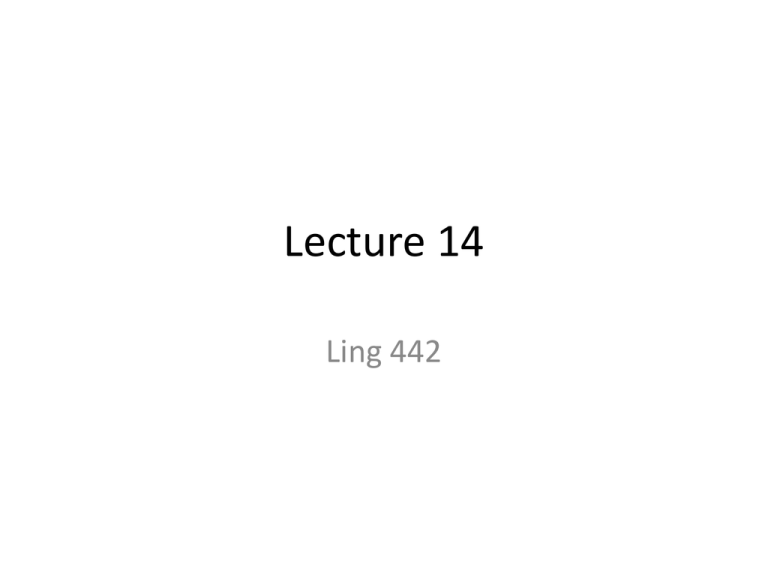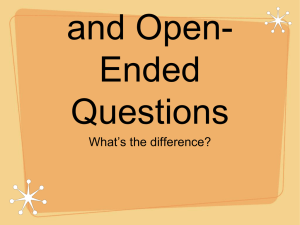Lecture14
advertisement

Lecture 14 Ling 442 Exercises (part 1) (2) on p. 173 a. Max drew his pistol. b.Donald heated the solution. c. Donald heated the solution to 70 degrees. d.Donald heated the solution for five minutes. e.Tim doodled on the table cloth listlessly. f. A strange mushroom appeared on the lawn. Exercises (part 2) A real story. (1) was uttered by a native speaker, and was misunderstood by another native speaker. Can you identify the two readings? 1.I didn’t sleep all weekend. Hint: all weekend is a universal quantifier over a set of times, and it interacts with negation. Analyzing Vendler’s four verb classes • State: Subject has an appropriate property continuously • Activity: Subject engages in a (more or less) homogeneous action continuously. Subject DOES something • Accomplishment: Subject DOES something and this causes some state to come into existence • Achievement: Some state comes into existence The subinterval property • A sentence f has the subinterval property iff the truth of f at a time t entails its truth at all subintervals of t. • States have this property (in idealized circumstances). • Kearns says that activities have the subinterval property. This is true only to a degree: we have to limit the sizes of subintervals. E.g. walking events (and running events) have minimal sizes. The English perfect (part 1) • is not compatible with adveribials that indicate past time. 1.*I have lost my wallet yesterday. indicates a resultant state/experience caused by a past event (or current relevance) 2.I have been to the Grand Canyon. 3.Princeton has been visited by Einstein. Vs. # Einstein has visited Princeton. The English perfect (part 2) can indicate ‘hot news’ 1.Russia has invaded Poland. can indicate a continuing state with a state predicate 2.Mary has lived in Seattle since 1976. 3.Mary has been living in Seattle since 1976. (The “continuing state” reading is obligatory in (3).) The English perfect (part 3) • existential reading (rather than a “definite past time” reading) 4. Have you seen the movie? In a question, the type of event described is still doable now (Baker 1989) • (asked of a person who has nearly been run down by a reckless driver who immediately left the scene) 5. Did you see the guy’s license number? 6. # Have you seen the guy’s license number? The English perfect (part 4) • Tense-like interpretations in forms other than the present perfect 1. Having lost his wallet yesterday, John is now in big trouble. 2. John seems to have lost his wallet yesterday. 3. John said last Sunday that he had lost his wallet the day before. 4. Mary may have played the piano yesterday. The simple past • First hypothesis: an existential quantifier over (the set of) all past times. That is, John left means that there is a past time at which John’s leaving occurs. But is this right? Partee (1973) questioned this idea by presenting (1). She shows that (2) and (3) are both wrong renditions. 1. I didn’t turn off the stove. 2. ~ t [t is a past time & I turn off the stove at t] 3. t [t is a past time & ~ I turn off the stove at t] The simple past • Partee’s idea: past tense is like a deictic pronoun. It denotes a particular past time salient in the context. • ~ I turn off the stove at t (where t denotes a past time) • Partee is correct in that a sentence in the simple past tense indicates reference to a contextually salient past time. But the question is whether that should correspond to the time of the event indicated by the verb. The simple past (part 2) If the salient past time is supplied by an overt or covert adverbial (like yesterday), then past tense itself may not provide a salient past interval itself. 1. Mary coughed at least once yesterday. 2. t [t is part of yesterday & Mary coughs at t] Reichenbach’s theory • Has three time points: S(peech), E(vent), R(eference). • Provides an appealing account of the intuitive difference between the simple past and the past perfect. • John left. E,R ____ S • John had left. E___ R ___ S • Provides an account of the difference between the simple past and the present perfect, too. Narrative and Tense/Aspect Puzzle: What is the difference between (1) and (2) (in truth conditions)? 1. Mary smiled. 2. Mary was smiling. You need a discourse context to explain the difference between them. (There are not appreciable truth conditional differences between them.)



